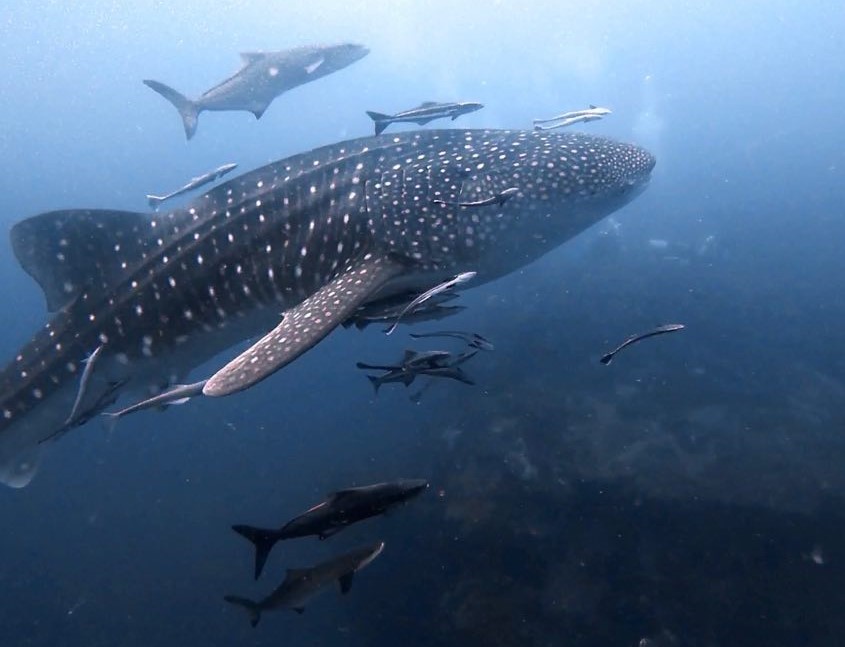Whale sharks

The whale shark is a shark species classified as Endangered on the IUCN Red List. It is the largest of all fish species in the world and can measure up to 19,6 meters. Whale sharks are estimated to live up to 130 years, which means the reach sexual maturity later in life when they are around 25-30 years old. Very little is known about their mating and is extremely rare to see but was recorded for the first-time last year in June outside of Ningaloo Reef, Australia. Females give birth to live young where the eggs hatch inside of the female before birth (ovoviviparous). Just like within other shark species, the pups don’t stay with their mother after birth. However, baby whale sharks are a mystery. As mentioned before, scientists still know very little about how whale sharks reproduce, where they mate, and where they give birth.
Here on Koh Tao divers are sometimes lucky to spot a whale shark, although locals do not all agree on when the best time of the year to see them are. Some believe it’s in February, others in April or October. What most people agree on though is that many of the sightings around Koh Tao are juvenile/younger adult whale sharks, meaning they are rarely over 6 meters long. Still, seeing one of these gentle giants during a dive makes you feel like a tiny individual… Here on Koh Tao, and worldwide, photo identification is used as a research tool to estimate population sizes and to giving information about moving/migration patterns, since each whale shark has individual patterns. This means that the general citizen can contribute to science, by sharing their photos of whale sharks to research groups. Here on Koh Tao, that research group is called Koh Tao Whale Sharks.
The main threats to the shark worldwide are human intrusion and disturbances (recreational activities like snorkelling) and biological resource use like targeted fishing and harvesting of aquatic resources. According to the Department of Marine and Costal Resources, Thailand have around 100 whale sharks roaming in their waters. The Indo-Pacific population have an estimated decline of around 50 % over the last three generation (75 years). Studies show that the annual catch rate from commercial Whale Shark fisheries in Taiwan have had a significant decrease (of around 58 %) between 1997 and 2001. Also, a decline in mean size and length was noted in Chinese waters, where mean size before 2004 was 8.27 m compared to 6.3 m between 2008-2011.
Provisioning (feeding) whale sharks is a fairly common method in some areas in the world to attract tourist by keeping the sharks in the same area all year-round. Whale sharks in Oslob, Philippines are fed >300 kg of uyap (sergestid shrimp) daily (6AM to 12PM, year-round). In the wild, whale sharks do not solely eat shrimp but thrive on a varied diet including other zooplankton, fish eggs, crab eggs, small fish and krill.
One of the main problems with the provisioning industry around whale sharks it that it effects the whale shark’s natural behaviour by interrupting migration patterns that is vital for the breeding of the shark. Studies also show that provisioning is affecting the sharks in a visual and physical way, by changing the shape of their head. This is since they change the position they are feeding, being more vertical than horizontal (since the provisioning comes from boats and are mainly on the surface). Also, studies in Oslob, Philippines show that about 95 % of all whale sharks seen in the area have scars on their body, believed to occur due to boat propellers.
Worldwide conservation efforts include keeping key feeding locations and migration corridors protected. Site protection is necessary in some areas where high densities of whale sharks are present, as anthropogenic pressures on these sites could have disproportionate impact on subpopulation declines. Where whale sharks are routinely feeding on the surface, areas should be managed to reduce vessel strikes in nearby shipping lanes. Mediterranean and Thai waters are where the shark population has declined at the highest rate, IUCN noted in its recent report. A way to stop the decline, Thailand now have the highest legal protection (since May 2019) of the whale shark species.
